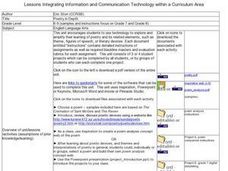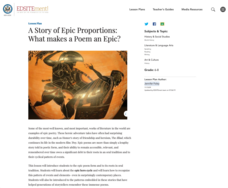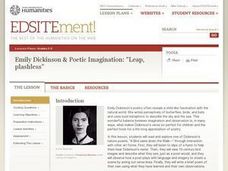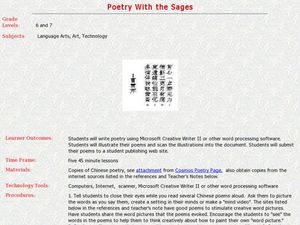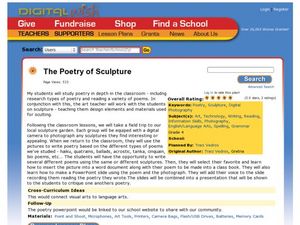Curated OER
"Your Son, Your Only One" - The Sacrifice of Isaac as a Motif in Holocaust Poetry
Class groups examine a series of poems that use Abraham’s willingness to sacrifice Isaac as a motif in Holocaust poetry. Included are questions, notes to the teacher, and bibliographical information on each poem. The activities could be...
Curated OER
Exploring the Irish in America Through Found Poetry
What was life like for Irish immigrants settling in America during the late 1800's? Learners examine primary source documents, such as lyrics, poems, and letters, to understand the immigrant experience. They then use those primary source...
Academy of American Poets
Poems about Poetry
Learners of all ages hear the words “Today we’re going to start poetry” and begin their plans to drop out of school. It is not the teacher's fault! Use this resource to help young scholars understand the genre of poetry and why it is...
Utah Education Network (UEN)
7th Grade Poetry: Ode Poem
Walt Whitman's "Captain, My Captain" and Robert Frost's "The Road Not Taken" provide seventh graders with examples of odes. After reading and discussing these and other examples, young poets craft an ode and respond to the ode of a...
Curated OER
Edward Lear, Limericks, and Nonsense
Introduce your class to the delights of nonsense poetry and explore literary devices with the writing of Edward Lear. Learners identify rhyme and meter as well as figures of speech, alliteration, and onomatopoeia in "The Owl and the...
National Endowment for the Humanities
Thirteen Ways of Reading a Modernist Poem
High schoolers analyze modernist poetry and the role of speaker in example poems. Learners study modernist poems from the Romanticism and Victorian periods as well as Wallace Stevens' "Thirteen Ways of Looking at a Blackbird." Using a...
Curated OER
Poetry in Depth
Scholars use technology to explore poetry and its related elements, such as theme, figures of speech, and other literary devices. They complete four poetry projects including a poem analysis with a concept web, an interactive poem...
National Endowment for the Humanities
The Impact of a Poem's Line Breaks: Enjambment and Gwendolyn Brooks' "We Real Cool"
Young scholars analyze the Gwendolyn Brooks use of enjambment in her poem "We Real Cool." In this poetry analysis activity, students define common poetic devices and the examples of enjambment in the poem. Young scholars discuss the poem...
Curated OER
Using Poetry As Inspiration for Composition
A reading of Robert Frost’s "The Road Not Taken" launches an interdisciplinary study of the connection between the meters of a poem and a melody. After identifying the number of beats in each line of the poem, young musicians use...
Curated OER
Letters from Emily Dickinson: Letters and Poems
Students analyze how Emily Dickinson perceived herself as a poet. Students read correspondence between Dickinson and her preceptor, Mr. Higginson to determine the depths of their relationship. Students interpret several of her poems.
National Endowment for the Humanities
Understanding the Context of Modernist Poetry
Students examine the historical, social, and cultural context of modernist poetry. They explore websites, complete a chart, compare/contrast rural and urban life, watch a video of early New York, and complete a writing assessment...
Curated OER
Analyzing Poetic Devices: Robert Hayden's "Those Winter Sundays" and Theodore Roethke's "My Papa's Waltz"
Analyze the poetic devices used in Robert Hayden's "Those Winter Sundays" to those found in Theodore Roethke's "My Papa's Waltz." Critical analysts discuss poetic meter and rhythm and its relationship to theme. They compare and contrast...
Learning for Justice
Maya Angelou
Maya Angelou's poem, "Still I Rise", offers young scholars an opportunity to consider how poets use literary devices to create powerful messages. After a close reading and discussion of the poem, class members reflect on how they can...
Syracuse University
Harlem Renaissance
The music and literature of the Harlem Renaissance defined American culture, including its poetry. Using a poem from the period, individuals explore its musical qualities and how it is reflective of the period. Then, they use what they...
National Endowment for the Humanities
Robert Frost's "Mending Wall": A Marriage of Poetic Form and Content
High schoolers examine the relationship between a poem's form and its content in Robert Frost's poem, 'Mending Wall.' They read and analyze the poem, explore websites, listen to an audio clip of Frost reading the poem, and write an...
National Endowment for the Humanities
A Story of Epic Proportions: What Makes a Poem an Epic?
Learners analyze the epic poem form and its roots in oral tradition. For this epic poetry lesson, young scholars research the epic hero cycle and recognize the pattern of events and elements. Learners analyze the patterns embedded in the...
Curated OER
Emily Dickinson & Poetic Imagination: "Leap, plashless"
Learners analyze the poems of Emily Dickinson and write their own nature poem. In this poetry analysis lesson, students read Dickinson poetry and analyze the use of imagery, sound, and metaphor. Learners write their own nature poem using...
Center for History Education
How Did the Public View Women’s Contributions to the Revolutionary War Effort?
Calling upon the legacies of Joan of Arc, Elizabeth I, and Catherine the Great, Esther Reed rallied Southern women to support the American Revolution. Using a broadside by Reed and other primary sources, such as poetry, young historians...
MENSA Education & Research Foundation
Magical Musical Tour: Using Lyrics to Teach Literary Elements
Language arts learners don't need a lecture about poetry; they listen to poetry every day on the radio! Apply skills from literary analysis to famous songs and beautiful lyrics with a lesson about literary devices. As class...
Maryland Department of Education
A Raisin in the Sun and Dreams Deferred
To conclude a study of A Raisin in the Sun and to prepare for a visit to the Lewis Museum, class members analyze Langston Hughes' poem "Harlem." Learners then draw connections to characters in the play and to their own experiences by...
Curated OER
Poetry With the Sages
Students write poems and input them into a word processing program. In this poetry lesson, students listen to Chinese poems and draw mental images. Students compose poems and illustrate them. Students share their work.
Maryland Department of Education
The Concept of Diversity in World Literature Lesson 9: Debating Imperialism
To gain an understanding of Imperialism, class members read Rudyard Kipling's poem, "The White Man's Burden" and Mark Twain's essay, "To the Person Sitting in Darkness." Groups compare these perceptions of non-white cultures with the...
Curated OER
The Poetry of Sculpture
Fourth graders practice writing poetry while examining all types of art. In this art analysis lesson, 4th graders participate in a field trip to a sculpture garden in which they view sculptures and create different forms of poetry about...
Curated OER
It's All Poetry to Me!
Fourth graders explore language arts by analyzing poetry styles. In this writing analysis lesson, 4th graders read several sample poems in class and identify similes, metaphors and other figurative language within them. Students analyze...








